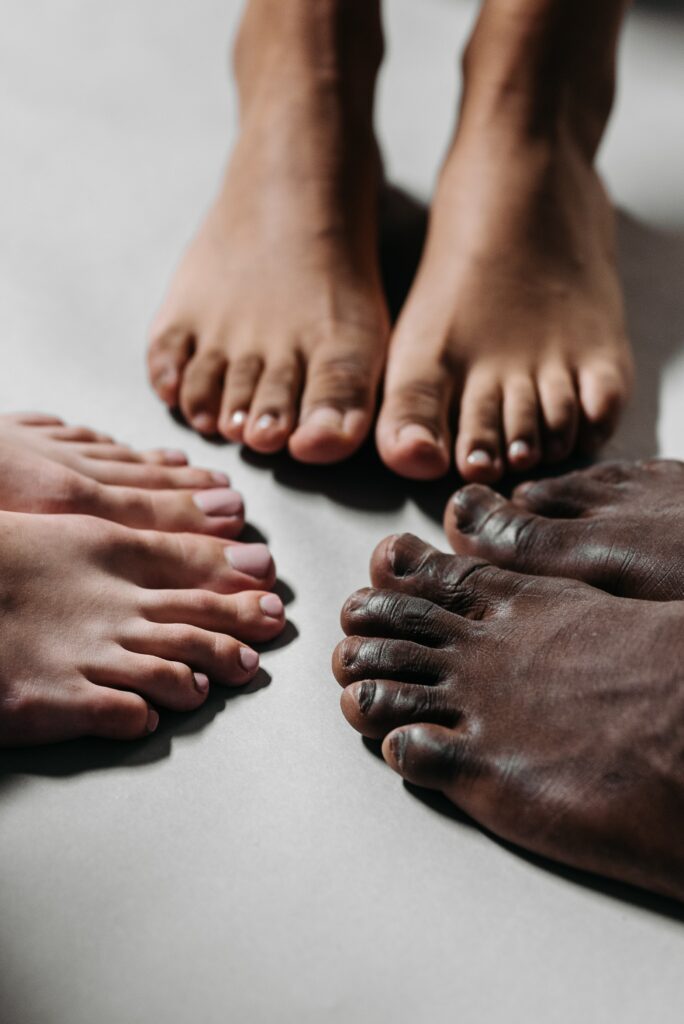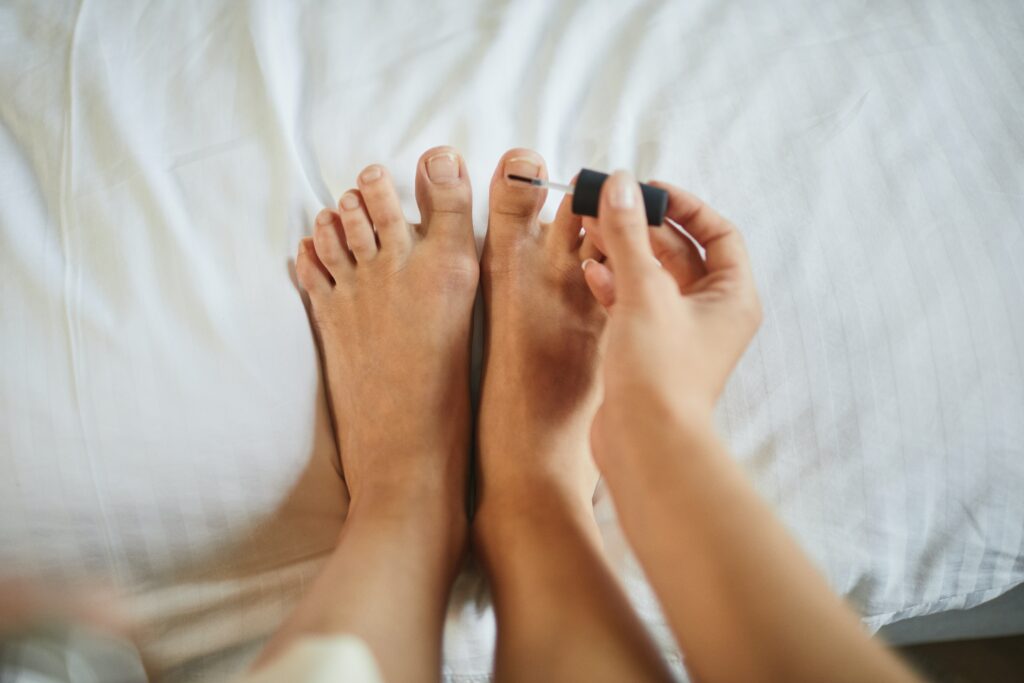Cracked Nails
Are your once healthy nails now looking splintered, split, and broken?
Cracked nails are actually a lot more common than you might think and affect people of all ages, although they are more common in those aged 60 and above.
Known in the medical world as onychoschizia, brittle, or cracked nails are not just unpleasant to look at, but they can also be a sign of a more serious health condition.
If you are worried about your cracked nails, then the below guide can help you to determine what has caused your nails to crack and how you can effectively treat the problem.
Read on to discover:
What are cracked nails
As the name suggests, cracked nails are nails that have started to crack, split, splinter, or become brittle. Cracked nails can affect both the fingernails and the toenails.
Unlike with a healthy nail that should be smooth with no apparent ridges, cracked nails may have pits or grooves and do not feel smooth to the touch.
While anyone can experience cracked nails, women are more prone to this than men, and adults aged 50 and over are also more likely to experience cracked nails.

What are the main symptoms of cracked nails?
Although each case is different and the exact cause of your cracked nails will dictate your exact symptoms, some of the most common cracked nails symptoms include:
- Cracks in the nail
- Splits or splinters in the nail
- Brittle nails
- Nails that break off
- Nails that have come off from the nail bed
Depending on what has caused your cracked nails, you may also experience other symptoms, including:
- Discolouration
- Distorted shape
- Bad odour
- Thickening of nails
If you feel any pain or discomfort around the nail or you notice any significant swelling, it can be a good idea to make an appointment with your doctor to rule out a more serious condition.
What causes cracks in your nails
There are several possible causes of cracked nails, including:
Ageing
The most common cause of cracked nails is the natural ageing process. As you age, your nails gradually start to become thinner and more prone to cracks and splits.
This is most prevalent in women aged over 60, but it can occur in men also. Cracked nails caused by ageing can affect both the fingernails and the toenails.
If your cracked nails are a result of ageing, you may also notice peeling of the nails and/or ridges developing. Again, this is completely normal and nothing to be concerned about.
An infection
A fungal nail infection can cause cracked nails, among other unpleasant symptoms. Incredibly common in men and women aged over 50, fungal nail infections can also cause discolouration of the nails, distortion of the nails, and a bad odour. In severe cases, it can also cause the nail to come away from the nail bed and fall off.
A fungal nail infection, known as onychomycosis, is more common in the toenails than the fingernails, but it can affect both.
Harsh nail products
If you use nail polishes and nail polish remover that contains strong chemicals, which most do, this can be the cause of your cracked nails. This is because these chemicals can weaken the nail and make it more prone to cracks, splits, and breakages.
If you regularly have artificial nails applied, the glue and dyes in acrylic nails can also cause cracked nails.
You may also notice other symptoms, including discolouration of the nails and dull-looking nails.
Wet environments
Placing your hands in and out of water on a frequent basis can wreak havoc with your nails and can lead to cracked nails. If you work in the hospitality industry or work outside, you may notice that your fingernails start to split.
If this is the cause of your cracked nails, you may also experience very soft fingernails and cracking that becomes worse in the cold weather.
Psoriasis
If you have the skin condition psoriasis, this can affect not just your skin but also your fingernails and toenails. You may also notice discolouration, loose nails, crumbling nails, red nail beds, and a rash and cracked nails.
You may notice psoriasis symptoms on just your nails, or you may have redness on other areas of your body also.
Iron deficiency
An iron deficiency, known as anaemia, can cause cracked nails as well as other symptoms, including fatigue, shortness of breath, pale skin, cold hands and feet, and cracks on the sides of your mouth.
A simple blood test can determine whether the cause of your cracked nails is anaemia.
Hypothyroidism
Hypothyroidism is a thyroid condition that means your body doesn’t make enough hormones. If this is the cause of your cracked nails, you may also experience:
- Brittle nails
- Swelling in your lower legs and around the eyes
- Itchy skin
- Thinning hair
- Yellowing of skin on your palms or soles of your feet
A simple blood test can determine if you have this condition or not.
Biotin deficiency
Biotin is a B vitamin that is sometimes referred to as vitamin H. Although biotin deficiencies are rare, they can cause cracked nails and split ends.
Other symptoms of a biotin deficiency include:
- Fatigue
- Lethargy
- Hair thinning or hair loss
- A red rash around the eyes, nose or mouth
- Conjunctivitis
- Depression and/or anxiety

How to treat cracked nails
The recommended treatment for your cracked nails will be dependent on the cause of the issue.
How to treat cracked nails caused by ageing
If your cracked nails are caused by the natural ageing process, then there isn’t really much you can do to stop this from happening. That being said, you can improve the condition of your nails by regularly moisturising and by keeping them clean and trimmed.
You may also want to invest in an ointment for cracked nails that has been specially designed to hydrate and strengthen the nails.
How to treat cracked nails caused by an infection
Cracked nails due to a fungal nail infection can be treated with an anti-fungal treatment such as Nailner Nail Fungus Treatment. This can be applied topically to the affected area.
It is worth noting that the treatment of fungal nail infections can be quite lengthy, especially if you have left the infection untreated for a long period of time. Once the infection has cleared up, you will then have to wait for a new, healthy nail to grow back. In the case of fingernails, this can take up to 6 months, and with toenails, significantly longer (12-18 months).
However, once you have started the treatment, you should see an improvement in your symptoms in between 10-14 days.
How to treat cracked nails caused by psoriasis
If you have nail psoriasis, there are several treatment options available to you, including injections of corticosteroids, laser treatment, and over-the-counter topical remedies.
You should also try your best to keep your nails short, use a file to keep the edges smooth, and moisturise your nails and cuticles daily.
How to treat cracked nails caused by a deficiency
If you have been to your doctor for a blood test and it has been confirmed that you have a deficiency such as anaemia, then a supplement is your best course of action.
This can be bought at your local chemist, ordered online, or picked up from most big supermarkets.

Can I treat cracked nails at home?
If you want to try fixing cracked nails at home, then there are several home remedies that you can try. However, you should know that these are not medically proven to work and will not be able to treat an infection.
That being said, there is no harm in using one of the below to complement your approved treatment.
Massage with coconut oil
If your nails are dry, brittle, and cracked, then coconut oil can help to restore moisture and improve their overall appearance. Simply massage warm oil directly onto the affected area twice a day.
Soak in apple cider vinegar
Apple cider vinegar contains lots of essential nutrients, including iron, calcium, magnesium, and potassium, all of which can help to strengthen cracked nails.
To use, dilute equal parts of apple cider vinegar with water and soak your nails for a few minutes. It can also be useful to gently push pack your cuticles.
Apply vitamin E
There are several vitamins for cracked nails, including vitamin E, which can help to rejuvenate and restore cracked nails.
To use, puncture a vitamin E capsule and apply the oil directly to the affected nail or nails.

How to prevent cracked nails
As well as finding the right treatment to tackle your cracked nails, there are also several preventative measures that you can adopt, including:
- Wash your hands and feet regularly
- Keep your nails dry
- Cut your nails straight across with clean nail clippers or scissors
- Avoid manicures and artificial nails such as acrylics
- Avoid biting your nails
- Wear gloves when washing up or doing other work that involves submerging your hands in water
- Wear flip-flops or other footwear when visiting public swimming pools
- Take a multivitamin
- Use a strengthening base coat
- Use anti-fungal foot powders to reduce sweat and stop nail fungus
- Avoid harsh chemicals
Frequently asked questions
What are you lacking when your nail splits?
If your nails have split, you are most likely lacking in iron. Known as anaemia, a lack of iron can also make you feel fatigued, cause thinning hair and make you look pale. To treat cracked nails caused by an iron deficiency, ask your doctor for a daily iron supplement or pick one up at your local chemist.
What causes ridges and splits in fingernails?
The most common cause of ridges and splits in fingernails is ageing. These are typically slight vertical ridges that run vertically down the nail. If you notice deep horizontal ridges, this can be a sign of a more serious health condition, so you should make an appointment with your doctor for a professional diagnosis.
Ridges and splits can also be caused by vitamin deficiencies or diabetes.
What causes cracked flaking nails?
Cracked flaking nails can be caused by ageing, pregnancy, frequent exposure to water or chemicals, skin disorders, vitamin deficiency, or even trauma. Sometimes, menopause, thyroid disease, and yeast infections can also cause cracked, flaky nails. Do what you can to protect your nails and take any recommended medication.
Do cracked nails grow out?
Yes, cracked nails will grow out as long as you address what causes your cracked nails and complete the recommended treatment. If you experience frequent cracking and/or splitting, you may want to try a nail hardening solution or apply tea tree oil.
How do you treat cracked nails?
To treat cracked nails, make sure that you first treat any infection, such as a fungal nail infection or bacterial infection. Once the infection has cleared, you can then apply a strengthening or hardening solution to your nails to help prevent future cracking.
If you work in a job that causes trauma to the nails, then you should invest in a pair of protective gloves and make sure that you keep your nails clean and dry where possible.
No products found